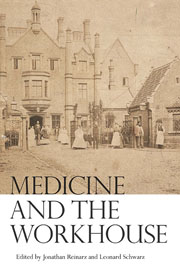Book contents
- Frontmatter
- Contents
- Preface
- Introduction
- Part One The Old Poor Law
- Part Two The New Poor Law
- 6 Workhouse Medicine in Ireland: A Preliminary Analysis, 1850–1914
- 7 Exploring Medical Care in the Nineteenth-Century Provincial Workhouse: A View from Birmingham
- 8 “Immediate Death or a Life of Torture Are the Consequences of the System”: The Bridgwater Union Scandal and Policy Change
- 9 Practitioners and Paupers: Medicine at the Leicester Union Workhouse, 1867–1905
- 10 Workhouse Medicine in the British Caribbean, 1834–38
- 11 Poverty, Medicine, and the Workhouse in the Eighteenth and Nineteenth Centuries: An Afterword
- Selected Bibliography
- List of Contributors
- Index
7 - Exploring Medical Care in the Nineteenth-Century Provincial Workhouse: A View from Birmingham
from Part Two - The New Poor Law
Published online by Cambridge University Press: 05 December 2013
- Frontmatter
- Contents
- Preface
- Introduction
- Part One The Old Poor Law
- Part Two The New Poor Law
- 6 Workhouse Medicine in Ireland: A Preliminary Analysis, 1850–1914
- 7 Exploring Medical Care in the Nineteenth-Century Provincial Workhouse: A View from Birmingham
- 8 “Immediate Death or a Life of Torture Are the Consequences of the System”: The Bridgwater Union Scandal and Policy Change
- 9 Practitioners and Paupers: Medicine at the Leicester Union Workhouse, 1867–1905
- 10 Workhouse Medicine in the British Caribbean, 1834–38
- 11 Poverty, Medicine, and the Workhouse in the Eighteenth and Nineteenth Centuries: An Afterword
- Selected Bibliography
- List of Contributors
- Index
Summary
Addressing Workhouse Infirmaries
The history of medical institutions has been central to the emergence of medical history as a field in British and other national contexts. Hospitals and medical schools, for example, have attracted considerable attention from historians, and published histories began to appear after the first anniversaries of these institutions were publicly memorialized in the nineteenth and twentieth centuries. A catalog of these celebrated institutions is literally too long to reproduce here but is confirmed by the most cursory glance at any history of medicine collection. Compared to the history of voluntary hospitals and medical faculties, however, other institutions have received minimal attention from historians. Workhouse infirmaries in particular continue to be neglected, appearing as second-rate institutions to the venerable voluntary hospitals, contrasting in particular with hospitals that achieved official teaching status.
Few workhouse infirmaries have been the subject of detailed, book-length histories. Exceptions in the British literature are few in number, including a history of the Battle workhouse in Reading, as well as a history of Dudley Road Hospital in Birmingham. The former study covers the history of a Berkshire institution from its inception as a union workhouse into a municipal hospital until its closure in 2005. George Hearn's history of Birmingham's workhouse infirmary concentrates on a midlands institution and its evolution from the late nineteenth century throughout much of the next century. Both volumes can be described as traditional institutional histories, documenting staff changes, administrative highlights, and gradual institutional growth.
- Type
- Chapter
- Information
- Medicine and the Workhouse , pp. 140 - 163Publisher: Boydell & BrewerPrint publication year: 2013

